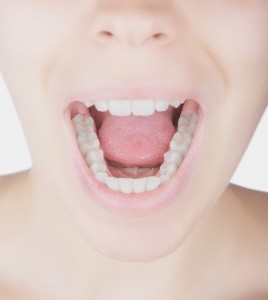Dry mouth is something we all get every once in a while, usually when we’re scared or nervous. It’s a normal part of the body’s anxiety response and usually, resolves itself whenever the stressful situation has passed. But, what happens when dry mouth lingers, when you have it all the time? That’s not normal, and it can have big ramifications for your oral health. Let’s take a look at how and why chronic dry mouth can occur, and what you can do stop the problem or mitigate the symptoms.
What is dry mouth?
The technical term for dry mouth is xerostomia and in general, it’s characterized by a mouth without adequate saliva. You may be surprised to know that this condition isn’t itself a disease, but a symptom of other issues. As we said above, short-term dry mouth is usually a stress response, but chronic dry mouth usually occurs as a side effect of certain medications such as antidepressants, allergy and pain medications, and antihistamines. It can also be a side effect of radiation and chemotherapy and can also be a symptom of diseases such as diabetes, Sjogren’s Syndrome, and HIV/AIDS.
The symptoms are a dry, scratchy and sometimes burning sensation in the mouth, which can also extend to the throat and nasal passages. Chewing, swallowing and speaking can be difficult, the lips can become dry and cracked, and you may even have a sticky sensation in your mouth. Chronic dry mouth can lead to the development of sores and fungal infections in the mouth and can lead to tooth decay and gum disease over time.
Why is saliva important?
Saliva production is one of our most important bodily functions, but one we rarely think about until something goes wrong. Saliva keeps the mouth moist, helps break down food and makes chewing and swallowing (and even talking!) easier. Normal saliva production also plays a role in maintaining a healthy mouth, as it’s the body’s way to rinse off the teeth and dislodge any food or beverage debris that may be left behind after eating or drinking. Lack of saliva means that your teeth aren’t getting continuously cleaned throughout the day, allowing bacteria to proliferate and wear away at the dental enamel and damage the hard and soft tissues in the mouth. In addition to bad breath, the excess bacteria and acidic substances in the mouth can lead to cavities, tooth decay, and gum disease.
So, what can I do?
If you have chronic dry mouth, it’s imperative that you maintain a thorough and vigorous oral hygiene routine since your teeth and gums don’t have enough saliva to help get rid of food and beverage residue during the day and while sleeping. Brushing and flossing thoroughly is really one of the only defenses you have against tooth decay and gum disease when you have chronic dry mouth, so it’s important not to slacken in your efforts.
As we said above, dry mouth itself isn’t a disease but is a symptom of other issues. Talk to your doctor about the medications you’re currently on and if dry mouth is a known side effect of any of them. If it is, then your doctor may be able to suggest alternative medications that may alleviate the problem.
If your dry mouth is a symptom or side effect of a disease or due to an ongoing treatment such as chemotherapy, symptoms may diminish as your condition improves or as treatment changes over time. However, there are things you can do to lessen the impact and to help stimulate saliva production. Sipping water throughout the day as well as chewing sugar-free gum or sucking on sugar-free mints will help keep the mouth moist. You should also avoid caffeinated drinks, alcohol, cigarettes, as well as salty and spicy foods, as they all can have severe drying effects on the mouth. Finally, you can use an over-the-counter saliva replacement to help keep the oral tissues moist and alleviate the dry, scratching and painful sensations chronic dry mouth can have. These saliva replacements often come as liquids or aerosol sprays and can be used throughout the day, whenever needed.
Chronic dry mouth can be a painful situation that can really interfere with your everyday life. We often take simple things like chewing and speaking for granted until we lose our ability to perform these actions normally. In addition to staying on top of your oral hygiene routine to keep your teeth clean, it’s important to talk with your doctor and dentist about ways you can stop chronic dry mouth by changing medications, or ways to mitigate the symptoms so you can eat and speak more easily. Got a question about dry mouth? Drop us a line or leave us a message below!








Leave a Reply